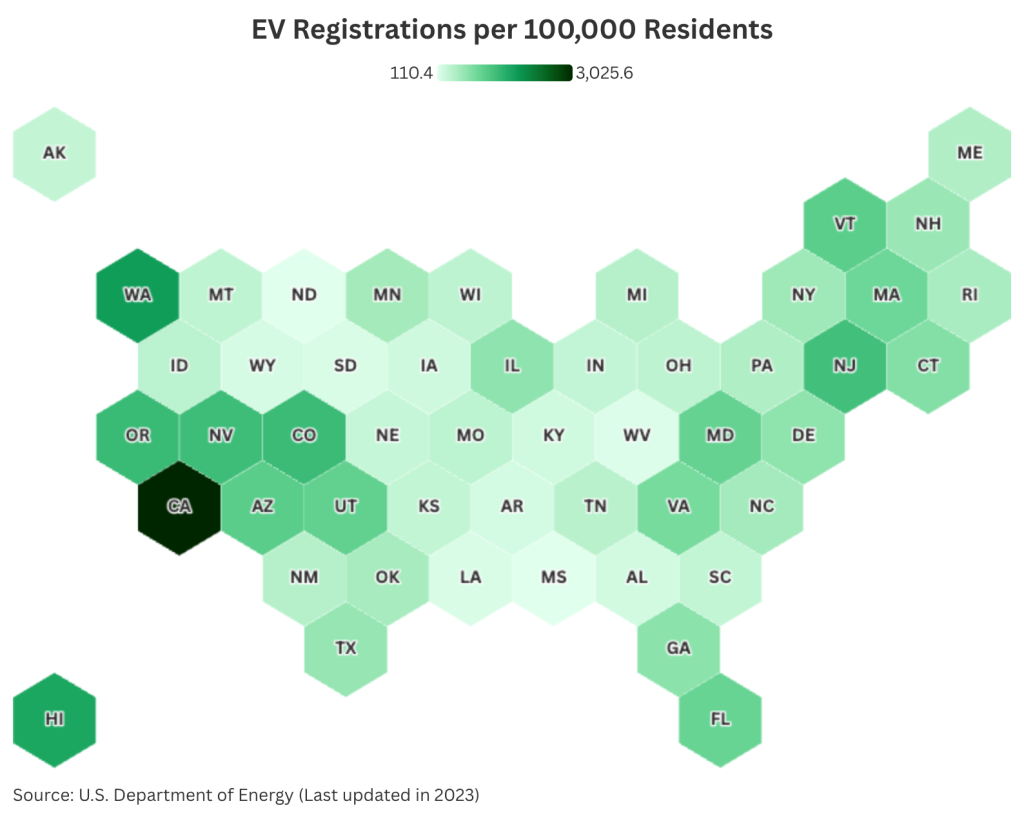
More electric vehicles means less gas tax revenue: How this impacts state budgets
More electric vehicles means less gas tax revenue: How this impacts state budgets
Electric vehicles are more popular than ever, with 21% of new car sales in the United States being either electric, hybrid, or plug-in hybrid models. One of the unintended consequences of this consumer trend is the effect on gas tax revenue.
Every gasoline and diesel sale in the U.S. includes a small added tax. This tax is used to fund state transportation budgets, highway maintenance, and infrastructure projects. As a result of more EVs on the road, the amount of revenue generated by the gas tax is decreasing. This has created interesting financial repercussions, and a variety of solutions are being adopted to help.
Using state-by-state fuel tax data from the Department of Energy and consumer EV trends from the Alternative Fuels Data Center, CheapInsurance.com analyzed the economic impact of the changing transportation landscape and what’s being done to remedy the situation.
Nationwide EV adoption trends
Millions of Americans are choosing to purchase electric vehicles over traditional gas ones. The reasons include reduced charging costs compared to gas, lower emissions, and tax incentives.
The Bureau of Transportation Statistics reported that, in 2024, there were 1.2 million electric vehicle sales and 1.6 million hybrid electric vehicle sales. This is up from 238,000 EV sales and 455,000 hybrid-electric sales in 2020. This upward trend is likely to continue.
New EV registrations by state
The rate at which EVs are being bought and put on the road differs by state. This is mainly influenced by government policies, cultural attitudes, and economic factors.
For example, California has recently tried to enact an EV mandate that requires a certain percentage of new vehicle sales to be fully electric. This plan was then adopted by 11 other states. Although later blocked by the Senate, this prompted many consumers to transition to EVs.
Culturally, many Americans across the country do not want EVs, which explains lower purchase numbers in some states. The Pew Research Center found that, in May 2025, only 18% of Republicans and Republican-leaning individuals were at least somewhat interested in purchasing one. This is compared to Democrats, with 48% somewhat or very interested. This data was collected via a survey of Americans conducted from April 28 to May 4, 2025. This suggests that “red states” will have lower numbers of EV registrations than “blue states.”

Top 5 states with the highest EV registrations per 100,000 residents
- California - 3,025.6
- Washington - 1,805.4
- Hawai‘i - 1,685.9
- Oregon - 1,421.9
- Colorado - 1,404.7
Bottom 5 states with the lowest EV registrations per 100,000 residents
- Mississippi - 110.4
- North Dakota - 111.7
- West Virginia - 143.6
- Louisiana - 164.6
- South Dakota - 169.3
A look at gas tax revenue loss in key EV states
The states with the highest EV registration numbers per 100,000 residents have the most significant loss in gas tax revenue. The number of EV vehicles on the road compared to gasoline vehicles is still quite low, so impacts are not being strongly felt yet. However, many states are predicting substantial losses in their gas tax revenue over the next decade.
In California, for example, the Mineta Transportation Institute predicts that there will be a 64% loss in revenue from 2025 to 2040. In this study, researchers considered eight different scenarios, each with a different rate of how many EVs are purchased, how many people in the state drive, and how many personal vehicles get registered. Results used 2024 inflation-adjusted numbers.
Budget impacts on state transportation departments
Millions of dollars in losses will have a severe impact on state highway and transportation departments if left unaddressed. According to the National Conference of State Legislatures, 2024 data pulled from the National Association of State Budget Officers states that gas tax revenue accounts for 35.9% of state transportation department revenue nationwide.
Without this revenue, several impacts will be felt:
- Deficits in highway and road maintenance
- Slower completion of infrastructure projects
- Less development and expansion
- Higher vehicle maintenance costs for the general population
How states are responding and planning for the future
States are recognizing that action needs to be taken to secure transportation budgets. Pew Research Center reports that many states are suffering from budget gaps and are having difficulty completing projects like bridge repairs.
To tackle the issue of reduced gas tax revenue, many states have begun taking measures and implementing programs that will generate revenue from electric vehicles instead.
EV registration fees
The most significant way that governmental bodies have buoyed transportation department revenue is with EV registration fees. These fees are charged at the initial time of registration and on an annual basis.
In Texas, for example, EV owners must pay $400 for the first-time registration and $200 each year, according to the Department of Energy.
Road usage charges
Other states are opting for a road usage fee. In Hawai‘i, EV owners are given the option to pay an annual, per-mile usage fee instead of a large registration fee. This is currently set at $0.08/mile, up to $50/year.
Oregon offers a similar program, called OReGO. California is also experimenting with its own pilot program.
What changes are needed on the road ahead?
It’s clear that policy change is needed to address the compounding loss in gas tax revenue as a result of widespread EV adoption. The amount of revenue that will need to be replaced is unclear, however, especially with an anticipated decline in EV demand due to the federal tax incentives ending.
Regardless, state agencies and the federal government will need to prioritize alternative methods for generating revenue. This could be through registration fees, road usage programs, or other revenue-generating systems that are put into place. It’s likely that the EV marketplace will continue to grow and that more households will begin replacing their gas vehicles, so prompt change is needed in the coming years.
This story was produced by CheapInsurance.com and reviewed and distributed by Stacker.



